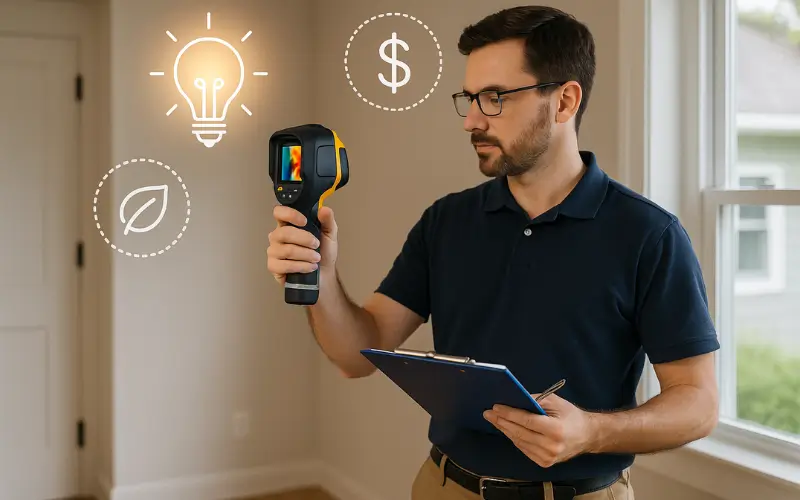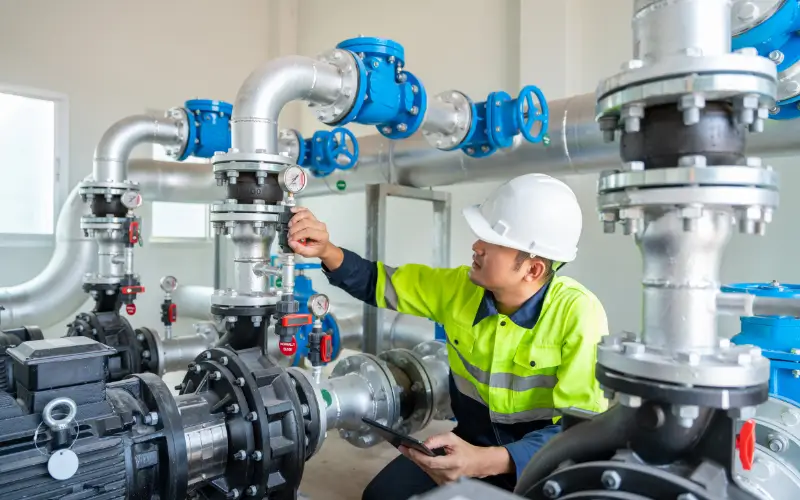Energy audits have become an essential step for homeowners, businesses, and industries aiming to reduce their energy consumption, cut costs, and promote environmental sustainability. But what exactly is an energy audit, and why should you consider getting one?
In this comprehensive FAQ guide, we will answer the most common questions about energy audits — from what they involve, how they’re performed, to their benefits and costs. Whether you’re new to the concept or looking to deepen your understanding, this article will help you navigate everything you need to know about energy audits, empowering you to make informed decisions about improving your energy efficiency.
By the end of this guide, you’ll have clear answers to your burning questions and practical insights into how an energy audit can help you save money and contribute to a greener future.
What is an Energy Audit?
An energy audit is a systematic process that evaluates how energy is used in a building, home, or facility. The goal is to identify opportunities to improve energy efficiency, reduce waste, and lower energy costs. During an energy audit, a professional auditor examines energy flows and consumption patterns, assesses equipment and systems, and pinpoints areas where energy-saving improvements can be made.
Types of Energy Audits
Energy audits can vary in scope and depth depending on your needs and budget. The main types include:
- Preliminary or Walk-Through Audit: A basic, quick inspection to identify obvious energy inefficiencies. It usually involves a visual assessment and review of utility bills.
- Detailed or Investment-Grade Audit: A comprehensive evaluation that includes detailed measurements, data collection, and analysis. It often provides in-depth cost-benefit analyses for recommended improvements.
- Targeted Audit: Focuses on specific systems or equipment, such as HVAC, lighting, or insulation, rather than the whole building.
Who Performs Energy Audits?
Energy audits are typically conducted by trained and certified energy auditors or engineers who have expertise in energy systems and efficiency measures. These professionals use specialized tools and knowledge to deliver reliable, actionable recommendations tailored to your specific building or facility.
Why Conduct an Energy Audit?
Conducting an energy audit is a crucial step toward understanding and improving your energy use. Here are the main reasons why getting an energy audit can benefit you or your organization:
Benefits of Energy Audits
- Cost Savings: Identifying and implementing energy-efficient measures can significantly reduce utility bills by cutting unnecessary energy consumption.
- Improved Energy Efficiency: Audits uncover inefficiencies in equipment, insulation, lighting, and HVAC systems, helping optimize performance.
- Environmental Impact: Reducing energy use lowers greenhouse gas emissions, supporting sustainability goals and environmental responsibility.
- Enhanced Comfort and Safety: Energy audits often reveal issues like poor insulation or ventilation problems that, when fixed, improve indoor comfort and air quality.
- Increased Property Value: Energy-efficient buildings are more attractive to buyers and tenants, potentially increasing property value.
When Should You Get an Energy Audit?
- Before making major renovations or upgrades to your building or facility.
- When your energy bills have been rising without a clear cause.
- To qualify for energy efficiency incentives or rebates.
- If you want to meet sustainability certifications or regulations.
How Often Should Energy Audits Be Done?
The frequency of energy audits depends on the size and type of your facility, as well as changes in technology or occupancy. Generally, it’s recommended to perform a comprehensive energy audit every 3 to 5 years, or sooner if significant changes occur.
How is an Energy Audit Performed?
An energy audit involves a systematic process to evaluate how energy is being consumed and where savings can be made. Here’s a step-by-step overview of what typically happens during an energy audit:
Steps Involved in a Typical Energy Audit
- Pre-Audit Preparation: The auditor reviews past utility bills, building plans, and any previous audit reports to understand your current energy use and concerns.
- On-Site Inspection: The auditor visits your property to inspect energy systems such as heating, ventilation, air conditioning (HVAC), lighting, insulation, windows, and appliances. They look for inefficiencies, leaks, and outdated equipment.
- Data Collection: Using specialized tools, the auditor measures energy consumption and environmental factors. This may include thermal imaging cameras to detect heat loss, data loggers to monitor electricity usage, and submeters for specific equipment.
- Analysis: The collected data is analyzed to identify patterns, waste, and opportunities for improvement.
- Reporting: The auditor prepares a detailed report with findings, recommended energy-saving measures, estimated costs, and expected savings.
Tools and Technologies Used
- Thermal Cameras: Detect heat loss through walls, roofs, and windows.
- Data Loggers: Record energy consumption over time for detailed analysis.
- Submeters: Measure energy use of specific machines or systems.
- Blower Doors: Assess air leakage in buildings.
Areas Assessed During an Energy Audit
- Building envelope (walls, roofs, doors, windows)
- HVAC systems
- Lighting systems
- Water heating and plumbing
- Electrical appliances and equipment
- Renewable energy systems (if any)
What Does an Energy Audit Report Include?
After completing the audit, the energy auditor provides a detailed report summarizing their findings and recommendations. This report is a key tool for understanding your energy use and planning improvements.
Key Findings
- Summary of current energy consumption patterns
- Identification of energy inefficiencies and problem areas
- Documentation of equipment condition and operational issues
Recommended Energy-Saving Measures
- Specific actions to improve energy efficiency (e.g., upgrading lighting, improving insulation, sealing leaks)
- Suggested equipment replacements or maintenance
- Behavioral changes to reduce energy waste
Cost-Benefit Analysis
- Estimated costs for each recommended measure
- Projected energy savings and payback periods
- Return on investment (ROI) calculations to help prioritize actions
Implementation Plan Suggestions
- Step-by-step guidance on how to implement recommended changes
- Potential funding sources, incentives, or rebates available
- Timeline considerations and scheduling advice
How Much Does an Energy Audit Cost?
The cost of an energy audit can vary widely depending on several factors, including the size and complexity of the building or facility, the type of audit performed, and the geographic location.
Factors Affecting Cost
- Building Size: Larger buildings generally require more time and resources to audit, increasing the cost.
- Audit Depth: A walk-through audit is less expensive than a detailed investment-grade audit.
- Complexity: Facilities with complex systems, like industrial plants, tend to have higher audit costs.
- Location: Labor rates and travel expenses can influence pricing.
Average Price Ranges
- Residential Walk-Through Audits: $100 to $500
- Commercial Walk-Through Audits: $500 to $2,000
- Detailed Commercial or Industrial Audits: $2,000 to $10,000 or more, depending on complexity
Are There Subsidies or Incentives Available?
Many governments, utilities, and organizations offer rebates, grants, or incentives to offset the cost of energy audits. It’s worth researching local programs that may reduce or even fully cover the expense.
Who Should Get an Energy Audit?
Energy audits are valuable for a wide range of building owners and managers. Understanding who benefits most can help you decide if an audit is right for you.
Homeowners
Homeowners can uncover opportunities to lower utility bills, improve comfort, and increase property value by identifying energy inefficiencies such as poor insulation, inefficient appliances, or air leaks.
Commercial Buildings
Businesses in offices, retail, hospitality, and other sectors can reduce operating costs, enhance sustainability credentials, and improve workplace comfort through energy audits.
Industrial Facilities
Factories and manufacturing plants often have significant energy consumption. Audits can identify process improvements, equipment upgrades, and operational changes to reduce energy use and costs.
Public Buildings
Schools, hospitals, government buildings, and other public facilities can benefit by demonstrating environmental responsibility and using taxpayer funds more efficiently.
Common Questions About Energy Audits
Many people have similar concerns or curiosities when it comes to energy audits. Here are answers to some of the most frequently asked questions:
How Long Does an Energy Audit Take?
- The duration depends on the size and complexity of the building. A simple residential audit might take 1 to 3 hours, while a detailed commercial or industrial audit could take several days or even weeks.
Will an Energy Audit Disrupt My Operations?
- Auditors strive to minimize disruption. Most inspections and data collection are scheduled to avoid peak business hours, and many tests are non-invasive.
Can I Do an Energy Audit Myself?
- While basic self-assessments are possible using online tools or checklists, professional audits provide more accurate, comprehensive, and actionable results due to specialized equipment and expertise.
How Reliable Are Energy Audit Recommendations?
- Certified energy auditors follow industry standards and use proven methodologies. Their recommendations are based on data and analysis, making them highly reliable if implemented correctly.
What Happens After an Energy Audit?
- You’ll receive a report outlining energy-saving measures. It’s then up to you to prioritize, budget for, and implement these recommendations. Many audits also include support for applying for incentives or financing.
Energy Audit Certifications and Standards
To ensure accuracy and professionalism, energy audits often follow established certifications and standards. Understanding these can help you select qualified auditors and interpret audit results.
Industry Standards
- ASHRAE (American Society of Heating, Refrigerating and Air-Conditioning Engineers): Provides widely recognized guidelines for conducting energy audits, including definitions of audit levels and procedures.
- ISO 50001: An international standard for energy management systems, helping organizations establish systems and processes to improve energy performance.
Certified Energy Auditor Credentials
- Certified Energy Auditor (CEA): Offered by the Association of Energy Engineers (AEE), this certification ensures auditors have the knowledge and skills to perform professional audits.
- Other Certifications: Some auditors may hold LEED accreditation, Building Energy Modeling (BEM) certifications, or state-specific licenses.
How to Choose a Qualified Energy Auditor
- Verify credentials and certifications.
- Look for experience relevant to your building type and industry.
- Check references or reviews.
- Ensure auditors use up-to-date technology and follow industry standards.
Frequently Encountered Challenges in Energy Audits
While energy audits offer many benefits, certain challenges may arise during the process. Being aware of these can help you prepare and get the most out of your audit.
Data Collection Difficulties
- Incomplete or inaccurate utility data can hinder analysis.
- Limited access to certain areas or equipment may restrict inspection.
- Variability in energy use due to seasonal or operational changes complicates assessments.
Resistance to Change or Investment
- Stakeholders may be hesitant to adopt recommendations due to upfront costs.
- Lack of awareness or understanding of long-term benefits can delay implementation.
Balancing Cost and Energy Savings
- Some energy-saving measures may have long payback periods, making budgeting difficult.
- Prioritizing projects requires balancing immediate cost savings with future benefits.
Conclusion
Energy audits are a powerful tool for identifying opportunities to save money, improve energy efficiency, and reduce environmental impact. Whether you own a home, manage a commercial building, or operate an industrial facility, understanding your energy use through a professional audit can unlock significant benefits.
By taking the time to assess your energy consumption, you not only lower costs but also contribute to a more sustainable future. If you haven’t already, consider scheduling an energy audit to discover how much you could save and how to optimize your energy systems effectively.
Taking action on audit recommendations can lead to lasting improvements in comfort, performance, and financial savings — making energy audits a smart investment for today and tomorrow.
Frequently Asked Questions (FAQs)
What is the difference between an energy audit and an energy assessment?
An energy audit is a thorough evaluation of a building’s energy use with detailed recommendations, while an energy assessment is often a more basic review or preliminary check.
Can energy audits help reduce my carbon footprint?
Yes, by identifying ways to lower energy consumption, audits contribute directly to reducing greenhouse gas emissions and your overall carbon footprint.
Are energy audits mandatory for certain buildings or businesses?
Some regions or industries require energy audits by law, especially for large commercial or public buildings. Check local regulations to confirm requirements.
How do energy audits tie into sustainability goals?
Energy audits provide actionable data to support sustainability initiatives, helping organizations reduce energy waste and meet environmental standards.
What new technologies are emerging in energy audits?
Advancements include smart meters, AI-powered analytics, drones for roof inspections, and more precise thermal imaging tools that enhance audit accuracy and efficiency.




